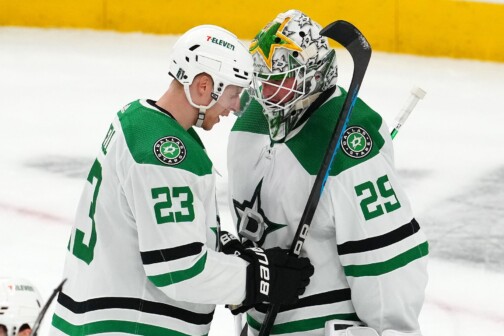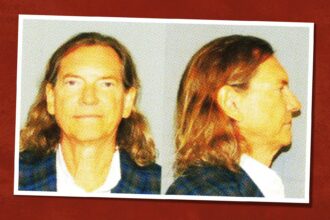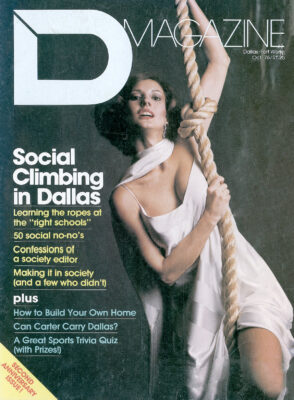“If Jimmy Carter can carry Dallas County, he probably can carry East Pakistan.” A Republican didn’t say that – a Democrat did. And he’s probably right, though I think he was also correct when he added: “Oh well, at least he’ll make it more interesting than old what’s-his-name, uh, McGovern.”
Now it could be argued that, say, a reconstructed Harold Stassen running as a labor-backed Democrat could make it more interesting than the man whom Democrats now less-than-affectionately refer to as “Kamikaze George.” After all, McGovern managed to lose Dallas County to Richard Nixon in 1972 by the unprecedented margin of nearly two and a half to one, and there are a lot of Democrats who think he might have lost by more had the polls been left open an hour later.
But the facts are, Jimmy Carter will make a race of it in Dallas County, the first real race provided by a Democratic nominee in this staunchly Republican county since Lyndon Johnson performed the incredible feat of actually carrying Dallas over Barry Goldwater in 1964. No one, least of all thinking Democrats, holds any illusions about Carter’s chance of doing that. Carter is a lot of things, but he’s no Johnson, and Gerald Ford is a lot of things, but he’s no Goldwater. But if you ignore the knee jerkers on both sides, there is a rough bipartisan consensus that Carter can make it very close. Certainly close enough to ensure carrying Texas easily. And perhaps close enough to make even the most regular of Dallas Republican Party regulars regret letting Ronald Reagan get away. The reasons for this are elementary: Carter may not be a Lyndon Johnson, but he’s also no George McGovern; nor for that matter, is he an Adlai Stevenson or a John Kennedy or a Hubert Humphrey. He’s Southern and he’s Baptist and that will help. Moreover, if “Let me say first, I know a lot more about national politics than local politics these days. But I think Dallas is a county that sets up well for Carter. His appeal is very broad. He’s talking about the things that concern many people in Dallas. I can tell that from the phone calls and letters and contributions I’ve been getting. They’re from people we didn’t hear from in 1968, and certainly didn’t hear from in 1972. There are a lot of Democrats here who want to vote for a Democrat, and we’ve now given them the opportunity.”
he can keep his rhetoric away from that suicidal Democratic platform, and hide Fritz Mondale in a hotel room when he comes to town, he will be a “safe” candidate, the first really safe presidential candidate conservative-to-moderate Dallas Democrats have had since LBJ. At the least, that puts him in a position to hold onto a lot of those Democrats who defected to the GOP in 1960, 1968 and particularly in 1972.
Ford, on the other hand, may not be a Barry Goldwater, but he isn’t exactly your Dwight Eisenhower either. Indeed, as a strategist and a campaigner, he’s not even a Richard Nixon. He is an incumbent Republican president nominated by his party by a margin of less than 100 votes. He is a Republican a good number of Republicans had trouble with, so it is unlikely he will stir the kind of moderate-to-conservative Democratic crossover that has helped cushion Republican presidential victories here since 1952. He is also the president who succeeded and pardoned Richard Nixon, and though Republicans don’t like to admit it, that has to count for something.
Unfortunately tor the Dallas Carter campaign, Ford’s association with Nixon and his other liabilities, and Carter’s Southern/Baptist/populist image, will not be enough to produce more than a 40 to 45 percent showing in Dallas County. It is simply not in the numbers. As Oak Cliff Democrat Dan Weiser, the master analyst of political numbers in Dallas and Texas says:
“Very difficult for Carter to carry Dallas. . .He’d do well to get 40 percent or so. In fact, if he does, he’ll carry the state. From my research, if a Democrat running statewide can get around 40 percent in Dallas or better, he can carry the state.
“I’ll put it this way: the Democrats will get more in Dallas this time than they have since Johnson.”
That’s saying something, because “Carter doesn’t have a chance in hell in Dallas County. As far as his Southern background giving him a good shot, I don’t know that it will help that much. I mean, the blue collar Democrats in Oak Cliff sure can’t live with Carter and Mondale, and a lot of downtown type Democrats may hedge their bets by giving money to Carter, but most, I bet will vote Ford-Dole. If Dallas had any kind of unemployment, for instance, or if there were a George Wallace as a third candidate in there, I would say Carter would have a chance of going maybe 50-50 with Ford. But as it is, I think Ford will not only get the Republicans in North Dallas, but the conservative Democrats in other sectors of the county who simply want to protect their pocketbooks.”
“Very difficult for Carter to carry Dallas. From my recollection, a brand new Democratic candidate running statewide almost always loses in Dallas County. He’d do well to get 40 percent or so. In fact, if he does, he has a good chance of carrying the state. From my research, if a Democrat running statewide can get 40 percent of Dallas or better, he can carry the state. That’s what Kennedy did in 1960.
“I think Carter’s Southern Baptist background will help. And I think he appeals to the middle-class white, which the Democrats haven’t had in their presidential candidates in a while. I’ll put it this way: the Democrats will get more in Dallas this time than they have since Johnson.”
“Carter will do better than Humphrey or McGovern did, but I think it will be very difficult for him to carry the county. Johnson carried Dallas, of course, but he was a favorite son running against a Barry Goldwater.
“I think a lot depends on how the Ford-Dole ticket affects the Republican frenchmen here, whether those Republican workers will spend their time on the Ford campaign, or on some local Republican race, the Alan Steelman campaign, or Nancy Judy’s. Frankly, I see the possibility of the Ford-Dole ticket electrifying Republican workers here as pretty remote, so I think a lot of them will choose to spend their time in local races.
“Ford and Dole will most likely carry the county, but it’s possible they could run behind, say, a Steelman in total Republican votes.”
“There are several things to consider. One, I don’t think the GOP is fielding the strongest possible ticket it could in Dallas or Texas statewide. Reagan or Connally on the ticket in some fashion would have been more popular here. That’s a plus for Carter. Two, another Carter strength is his Southern Baptist, non-Washington image. And three, Carter is simply a better campaigner than Ford.
“On the other side of the coin, I have to admit that the Republicans do have their people registered; we don’t, though we’re working at it hard. And they’re good at turning their people out.” Dallas is generally regarded as one of the most solidly Republican counties in the nation. How that happened in rigidly Democratic Texas is a source of constant and wild speculation among Dallas politicians. As one local Republican leader explains it, “At one point, we put a wall around the city, and we haven’t let a Democrat in since.”
In fact, it does appear that something like that happened in 1948. Until then Dallas, like the rest of Texas and the South, had been monolithically Democratic. But as Texas handed Democrat Harry Truman a typical 65 percent victory over Republican Thomas Dewey, Dallas gave Truman only 51 percent of the vote. A strong third-party candidacy by Strom Thurmond helped make that possible, but the fact that Republican Dewey had polled 35,000 votes in a county where the GOP had been a laughing stock since the Civil War was a clear omen of a major partisan shift in Texas’ most urbanized county.
The general elections of 1952 and 1956 did not provide any clues as to whether Dallas’ flirtation with the GOP in 1948 was serious or not. Dallas voted solidly in both years for Republican Dwight Eisenhower over Adlai Stevenson, but so did the rest of the state. It was not until 1960 that Dallas was able to display clearly her new political colors. While the rest of the state returned to the Democratic fold and handed Texas to Democrat John Kennedy, Dallas gave Republican Richard Nixon a 60,000 vote victory. Since then, it has been pretty much downhill for Democrats in Dallas, except for favorite son Lyndon Johnson’s victory here over Goldwater in 1964. Even then, Johnson managed to carry Dallas by only 29,000 votes, or 54 percent, while carrying the state by 63 percent.
So Jimmy Carter’s problem with Dallas is, like his predecessors’, essentially mathematical. Since 1948, for example, Democratic turnout in presidential elections has increased a little less than three times; Republican votes have increased a little less than 10 times. That ratio includes the perverted totals produced by the 1972 McGovern-Nixon race, so it may be somewhat exaggerated. But even discounting the 1972 totals, and using 1968 returns as the final total, Republican turnout in presidential elections has grown almost twice as fast as Democratic turnout since 1948.
Carter’s problem with numbers can be seen more concretely by reviewing voter registration by county commissioners’ precincts. Precinct 1, the Northwest quarter of the city, is clearly the most Republican quadrant in the county. It has 191,000 registered voters. Precinct 3, the most Democratic quadrant, has only 129,000 voters. And that does not take into account the fact that the Republicans traditionally turn out in much higher percentages than the Democratic areas, many of which are black. As one local Democratic leader says, “We would have to register many more, and turn them out at 80 percent to carry for Carter.”
But that is not necessarily the object of the Carter campaign here. The official line, of course, comes from local Carter head John Bryant and county Democratic chairman Ron Kessler, both of whom say it will be difficult, but that Carter could carry the county. A more realistic assessment comes from former Democratic congressional candidate Martin Frost, recently named North Texas coordinator for Carter, who says, “the main objective of the Carter campaign. . .has to be keeping any losses here as low as possible so that Dallas County doesn’t tip the entire state.”
Carter certainly is in a position to do that. There seems little doubt he will do as well as Kennedy did in 1960 (37 percent) or Humphrey did in ’68 (35 percent). Indeed, it is likely he will do anywhere from 5 to 8 percent better, if only because his regional and religious background is compatible with the area’s, and could curtail any substantial conservative-to-moderate Democraticcrossover to Ford. The Republicansdon’t like to admit that crossover exists,but I think that if it hasn’t by itself produced the string of Republican victories here since 1952, it certainly has helped to produce the healthy margins of those victories.
Moreover, Carter could be the beneficiary of the enigmatic Wallace votes. There is – or was, anyway – a Wallace vote in Dallas County sizable enough to be reckoned with. Wallace polled 56,000 votes here as a third party candidate in 1968, a good 15 percent of the vote. That’s not chicken feed, particularly when you consider Nixon’s margin of victory over Humphrey that year was 60,000 votes.
If, in fact, the Wallace vote still exists – and there’s little reason to suspect it doesn’t, in some form – Carter clearly will get all of it that bothers to turn out. Republicans like to talk about how the Wallace vote is really theirs, about how the Wallace people voted en masse for Nixon in 1972 and would have in 1968 had Wallace not run third-party. But it’s that kind of reasoning, among other things, that has reduced the GOP’s national constituency to a puny 20 percent.
For one thing, Wallacites voted for Nixon in 1972 as a matter of ideological survival. So did most Americans, save those few who shared McGovern’s zeal for warmed-over New Left politics. For another, Wallacites have always hated Republicans even more than liberals. The Wallace movement is essentially social, not political, and as such it has more to do with a lower-middle-class-white-working-man repudiation of a government increasingly run by men from big cities wearing white collars than with a repudiation of the doctrinaire liberalism of the Democatic Party. In other words, Wallacites may find a lot to quarrel with in the platform the Democrats saddled Jimmy Carter with, but they’ll more than likely be willing to overlook it because he’s “one of their kind.” Or at least he’s more “one of their kind” than Yale-educated, Mid-westerner Jerry Ford. As former local Wallace leader M.E. Bradford puts it: “The Wallace people will do one of two things this November: stay home, or vote for Carter.” Depending on how many choose the latter, Jimmy Carter could, in fact, produce the best Democratic showing here since 1964.
The Wallace vote is the most calculable of a host of incalculables in the Dallas County presidential race this fall. For example, the Republicans could get smart, stop running against Carter (the man) and wage a tough rhetorical campaign against Carter (the Democratic platform). If enough scare talk about how a vote for Carter is a vote against right-to-work and a vote for federally-subsidized jobs and abortion sank in, those middle-of-the-road Democrats so crucial to a good Carter showing here could forget where he’s from and where he goes to church and vote for Mr. Safe. On the other hand, any deleterious effects Carter’s platform might have on his campaign might be offset by Ford’s big albatross, the Nixon pardon. And none of that is to ponder the possible impact of the current Democratic coun-tywide voter registration drive, or the absence of a gubernatorial race on the ballot, or of the Alan Steelman-Lloyd Bentsen senate race.
None of those unknown factors couldaffect traditional voting patternsenough to produce a Carter victoryhere. But any or all of them could affecthis showing by as much as 10 percent,either way. And as one rather philosophical Democrat said: “Good Lord, atleast there is some unpredictability to it.In ’72, the only thing we couldn’t figurewas how much was it possible for Mc-Govern to lose by.”
Get our weekly recap
Brings new meaning to the phrase Sunday Funday. No spam, ever.
Related Articles

Hockey
What We Saw, What It Felt Like: Stars-Golden Knights, Game 4
The series is back on.
By Sean Shapiro and David Castillo
Local News
Leading Off (4/30/24)
Partly sunny today, with a high of 85 and chances of justice
By Tim Rogers

Local News
Bill Hutchinson Pleads Guilty to Misdemeanor Sex Crime
The Dallas real estate operator and erstwhile reality TV star will serve time under home confinement and have to register as a sex offender.
By Tim Rogers


